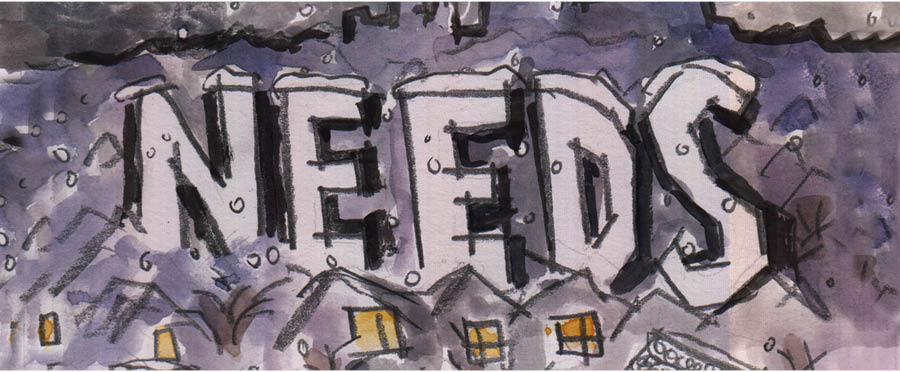Fanfiction and the Need to Keep Reading

It’s not news that fanfiction is another one of these aspects expanding into the pop culture stream of consciousness. The old mantle of shameful secrecy is being cast off, and flashlights are revealing just how vast and sprawling the fanfiction Internet-cave really is. There’s something to be said for a space to share stories that can’t find a home anywhere else.
Fanfiction means fiction written by a fan of a popular book, film, television series, et cetera, that involves characters and settings from that book, film, or series. It has had a reputation for being weird, deviant, and/or explicit, along with other adjectives that keep outsiders wary and reluctant. Sometimes it is all those things, though rest assured, there’s still a readership for it. But in a lot of ways, the need for fanfiction is a lot simpler than that, and even more innocent.
The Loft’s current theme of Needs, refers to the need for all stories, not only the ones with a big publisher behind them. What better way to share community and experience with someone else than through the shared love of a fictional world?
If you look at a story as if it’s a map instead of a linear sequence of events, there are infinitely more places to explore the world, the language, the characters. Fanfiction can take root anywhere within that map and keep the story growing, so that it expands from the inside out in every direction, instead of solely marching forward with no room to look back. It feeds the reader’s simple need to keep the story going. In the same vein as, “Imitation is the sincerest form of flattery,” it’s staggering to comprehend the vast amounts of love that readers possess and pour into a fictional universe that someone else has created, whether they’re reading or writing. Perhaps writing in a world they’ve been reading about makes it seem more real, having a measure of control over things in that world makes it feel more like home. The different categories of fanfiction that allow a reader to put themselves into a different world, put characters in different situations, solve problems in new ways, and above all, keep a world flourishing because they aren’t ready to leave yet.
For legal reasons, fanfiction is necessarily the work of amateurs, people who are readers instead of writers. Thus the Internet is continually surprised when it encounters fanfiction that is “actually good.” But if you want to be a writer, you have to be a reader, so people who love a book or a series enough to write their own stories about it clearly have some sense of the written word.
If nothing else, fanfiction has changed the literary landscape in a lot of ways, such as creating its own vocabulary and vernacular, diversifying the reading community, and even in inspiring legal discussions over issues in intellectual property and creative expression, like difference between copyright and plagiarism. Copyright is using someone else’s work, ideas, or intellectual property without permission, while plagiarism is passing someone else’s work off as your own, without citing where it came from.
Fanfiction then, a form of writing based on using other people’s ideas, exists in a sort of nebulous state as far as literature goes. Writers of fanfiction are required to be upfront about the fact that the characters and settings used are under someone else’s copyright, and they don’t get paid for their writing. Hint: that would be illegal.
Works like Wicked, both the novel and the Broadway musical, Ponyo, Hayao Miyazaki’s version of The Little Mermaid, and the television series, Once Upon a Time, are similar to fanfiction but are legal because the authors of the original works have died over fifty years ago, thus passing into the public domain. The same thing goes for Shakespeare and his work.
One of the most famous conversations around fanfiction, except for maybe 50 Shades of Grey, involves Cassandra Clare, a popular young adult fiction writer. She began her career writing fanfiction for the Harry Potter fandom. Her stories focused on antagonist Draco Malfoy and made him more sympathetic, even ending up with Ginny Weasley by the end. Her novel-length stories were immensely popular online, illustrating the needs of her readers along with her own. There is quite a large population on the Internet that wants more of Draco Malfoy, perhaps because he’s better dressed than the rest of his peers, or perhaps because he shows that no character is beyond redemption. In Clare’s fanfiction and many other pieces, the world of magic and Hogwarts created by J.K. Rowling isn’t the most important thing going on; it’s about the way characters relate to each other and communicate. Defeating Voldemort is, of course, still important, but not as important as the friendship between Draco and Harry, two neglected boys.
Or, there’s novelist and fanfiction-reader Rainbow Rowell, who wrote a novel in which the main character writes fanfiction about a fictional series… after which Rowell wrote two more novels as complete works of fanfiction about the fictional universe she had previously created.
Confusing? Maybe so, but in the original novel, Fangirl, fanfiction is a way to cope with the anxiety surrounding change and relationship turmoil. Fanfiction serves as a way to escape frustration and hurt, and return to a more familiar world where the rules are easier to understand. Once she had finished Fangirl, Rowell realized she didn’t want to let the fictional series go yet, hence the resulting novels Carry On and Wayward Son, about wizards and vampires for more readers and writers to escape into. It’s an impressive feat of imagination.
The idea of fanfiction still carries a fair amount of stigma, yet the reasons people need it are fairly straightforward. Why accept the end of the story if you don’t have to?
Originally from Minnesota, Ellen Ray recently graduated from Boston College with a degree in English concentrating in creative writing. Amidst four years of writing workshops and analyzing independent films, she spent a semester wandering around New Zealand, including a night spent in a cave with local penguins. She has written for The Laughing Medusa, an all-female literary journal, as well as various nonprofit organizations. After various internships and an attempt at freelance writing, she found herself the Communications and Marketing intern at The Loft.

